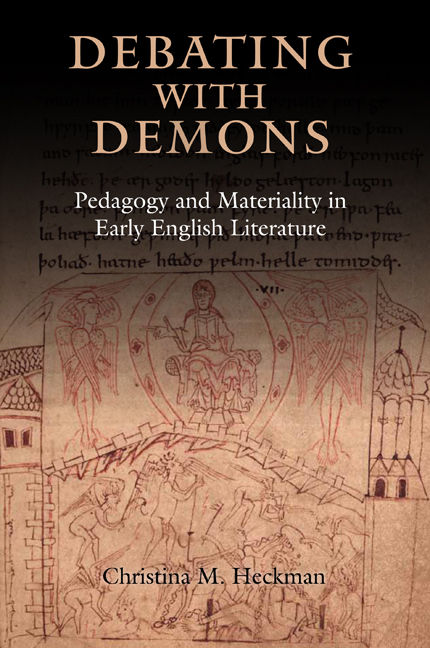Book contents
- Frotmatter
- Dedication
- Contents
- Introduction: The Devil’s Secret Chamber
- Part I Foundations
- 1 Spirituo-Materiality in the Early Middle Ages
- 2 The Artes Liberales in the Early Middle Ages
- 3 The Devil Within: Perils of Pedagogy in the Monastic School
- Part II The Demonic Magister in Early English Poetry
- 4 The Origin of the Teaching Demon: Lucifer as Magister
- 5 Demonic Teaching and the Fall in the Old English Genesis
- 6 Demonic Teaching and Saintly Discretio in Cynewulf’s Juliana
- 7 Inventing Materia: The True Cross and Saintly Disputation in Cynewulf’s Elene
- Conclusion: The Mysteries of Pedagogy
- Bibliography
- Index
- Acknowledgments
- Anglo-Saxon Studies
7 - Inventing Materia: The True Cross and Saintly Disputation inCynewulf’s Elene
Published online by Cambridge University Press: 06 October 2020
- Frotmatter
- Dedication
- Contents
- Introduction: The Devil’s Secret Chamber
- Part I Foundations
- 1 Spirituo-Materiality in the Early Middle Ages
- 2 The Artes Liberales in the Early Middle Ages
- 3 The Devil Within: Perils of Pedagogy in the Monastic School
- Part II The Demonic Magister in Early English Poetry
- 4 The Origin of the Teaching Demon: Lucifer as Magister
- 5 Demonic Teaching and the Fall in the Old English Genesis
- 6 Demonic Teaching and Saintly Discretio in Cynewulf’s Juliana
- 7 Inventing Materia: The True Cross and Saintly Disputation in Cynewulf’s Elene
- Conclusion: The Mysteries of Pedagogy
- Bibliography
- Index
- Acknowledgments
- Anglo-Saxon Studies
Summary
In Cynewulf's Juliana, the saint demonstrates her ability to adjust her opponents’ premises and pose new questions, establishing alternate forms of reasoning that recast the relationship of the spiritual, mental, and material. While Juliana focuses closely on the saint herself, Cynewulf’s Elene places the relic of the True Cross at the center of Christian life and learning, representing sainthood as a highly contested and disputed category circulating around Christ's most famous, absent, and longed-for relic. The True Cross eludes even the poem's saints, the imperial queen Elene (Helen) and the learned convert-Jew Judas Cyriacus who, according to Cynewulf's account, was ‘taught’ along with his Jewish brethren to conceal the True Cross by Satan himself.
The inventio of the True Cross coincides with the saintly struggle to pose questions and arguments that lead to knowledge among the many other distracting, indeed detracting, demands of the Christian imperial project. In the poem, intellectual and spiritual processes coincide with materiality: the relic is inseparable from the dialectical and logical activities that surround it and which, eventually, it enables. The quaestiones posed in Elene, however, especially those asked or implied by the queen herself, do not always tend toward truth or discovery. In the poem, multiple argumentative narratives lead toward, or more frequently away, from the inventio of the True Cross, as both materia and topos. The containment and limiting of the True Cross at the poem's end testify to its terrifying plenitude and ultimately uncontrollable power.
In Cynewulf's account, the True Cross emerges gradually into presence. Its miraculous appearance in Constantine's dream leads to Elene’s journey to Jerusalem and her councils with the wise men of the Jews, ostensibly to discover the True Cross's hiding place. Their debates induce Judas Cyriacus to conceal his own story of the True Cross, leading to his torment at Elene's command. Finally, at the prayer of Judas, who defeats the devil in a dispute and rejects his demonic ‘teaching,’ the True Cross reveals itself through a miracle manifested in physical form. By the poem’s end, Judas and Elene are both designated as teachers, reconciled by the True Cross's presence to forego their former animosity and cooperate in the imperial epistemological project.
- Type
- Chapter
- Information
- Debating with DemonsPedagogy and Materiality in Early English Literature, pp. 178 - 204Publisher: Boydell & BrewerPrint publication year: 2020



